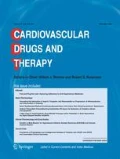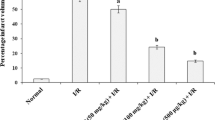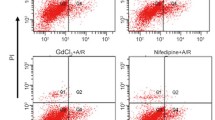Abstract
Objective: To elucidate whether endoxin is one of important factors involved in myocardial ischemia reperfusion (MIR) injury, the change of myocardial endoxin level was determined in rats with MIR injury model and the effects of anti-digoxin antiserum (ADA), an endoxin specific antagonist, on MIR injury were studied.
Methods: MIR injury model was obtained by ligating left anterior descending coronary artery 30 min followed by 45 min reperfusion. Sprauge Dawley rats were randomly divided into six groups of 10 rats, each. Sham group, MIR group, normal saline group, ADA 9, 18 and 36 mg · kg−1. ECG was continuously recorded. After reperfusion left ventricular myocardium samples of ischemic area were processed immediately. Myocardial endoxin level, Na+-K+-ATPase, Ca2+-ATPase, Mg2+-ATPase activities, and intramitochondrial Ca2+ content were measured.
Results: Myocardial endoxin level was significantly increased; Na+-K+-ATPase, Ca2+-ATPase, and Mg2+-ATPase activities were remarkably decreased; intramitochondrial Ca2+ content was remarkably raised; ST segments of ECG were significantly elevated and occurrence and scores of ventricular arrhythmias were significantly increased in early stage of reperfusion in rats with MIR. In all groups with ADA, myocardial endoxin level was remarkably decreased; Na+-K+-ATPase, Ca2+-ATPase and Mg2+-ATPase activities were drastically increased; intramitochondrial Ca2+ content was declined; ST segments and ventricular arrhythmias were improved.
Conclusion: Myocardial endoxin level was increased in MIR, which implies that the elevated endoxin may be one of major factors inducing MIR injury. This postulate is supported by the observation that ADA has protective and therapeutic effects against MIR injury probably by antagonizing the action of endoxin. The underlying mechanism may be ascribed to restoration of energy metabolism, and attenuation of intracellular Ca2+ overload.
Similar content being viewed by others
References
Grinwald PM. Sodium pump failure in hypoxia and reoxy-genation. J Mol Cell Cardiol 1992;24:1393–1398.
Steenbergen C, Murphy E, Watts JA, London RE. Corre-lation between cystolic free calcium, contracture, ATP, and irreversible ischemic injury in perfused rat heart. Circ Res 1990;66:135–146.
Nawada R, Murakami T, Iwase T, et al. Inhibition of sar-colemmal Na, K-ATPase activity reduces the infarct size-limiting effect of preconditioning in rabbit hearts. Circulation 1997;96:599–604.
Hamlyn JM, Lu ZR, Manunta P, et al. Observation on the na-ture, biosynthesis, secretion, and significance of endogenous ouabain. Clin Exp Hypertens 1998;20:523–533.
Ke YS. Endoxin: A major factor regulating cardiovascular system. Acta Pharmacol Sin 2001;22:201–209.
Ke YS, Tao YY, Yang SY, Zhao ZD, Li S. Circardian change of endogenous digitalis-like factor in acute myocardial in-farction. Chinese J Cardiol 1990;18:360.
Bagrov AY, Kuznetsova EA, Fedorova OV. Endogenous digoxin-like factor in acute myocardial infarction. J Intern Med 1994;235:63–67.
Bagrov AIa, Zhabko EP, Maslova MN, Rukoiatkina NI, Ukhanova MV. The role of an endogenous digoxin-like factor in regulating blood circulation and in the origin of arrhyth-mia in myocardial ischemia. Ter Arkh 1989;61:84–89.
Hong CY, Huang SS, Tsai SK. Magnolol reduces infarct size and suppresses ventricular arrhythmia in rats subjected to coronary ligation. Clin Exp Pharmcol Physiol 1996;23:660- 664.
Curtis MJ, Walker MJA. Quantification of arrhythmias using scoring systems: An examination of seven scores in an in vivo model of regional myocardial ischemia. Cardiovasc Res 1988;22:656–665.
Ravinggerov T, Tribulova N, Slezak J, Curtis MJ. Brief, in-termediate and prolonged ischemia in the isolated crystal-loid perfused rat heart: Relationship between susceptibility to arrhythmias and degree of ultrastructural injury. J Mol Cell Cardiol 1995;27:1937–1951.
Erdmann E, Philipp G, Scholz H. Cardiac glycoside recep-tor, Na-K-ATPase activity and force of contraction in rat heart. Biochem Pharmacol 1980;29:3219–3129.
Laredo J, Shah JR, Lu ZR, Hamilton BP, Hamlyn JM. An-giotensin II stimulates secretion of endogenous ouabain from bovine adrenocortical cell via angiotensin type-2 (AT2) receptors. Hypertension 1997;29:401–407.
Shah JR, Lerado J, Hamilton BP, Hamlyn JM. Different signaling pathways mediate stimulated secretions of endogenous ouabain and aldosterone from bovine adrenocortical cells. Hypertension 1998;31(1 Pt 2):463–468.
Takahashi H, Matsusawa M, Ikegaki I, et al. Digitalis-like substance is produced in the hypothalamus but not in the adrenal gland in rats. J Hypertens 1988;6:S345-S347.
Ke YS, Liu ZF, Yang H, et al. Effect of anti-digoxin antiserum on endoxin and membrane ATPase activity in hypoxia-reoxygenation induced myocardial injury. Acta Pharmacol Sin 2000;21:345–347.
Author information
Authors and Affiliations
Rights and permissions
About this article
Cite this article
Ke, YS., Wang, DG., Wang, HG. et al. Endoxin Antagonist Lessens Myocardial Ischemia Reperfusion Injury. Cardiovasc Drugs Ther 18, 289–293 (2004). https://doi.org/10.1023/B:CARD.0000041248.20065.47
Issue Date:
DOI: https://doi.org/10.1023/B:CARD.0000041248.20065.47




